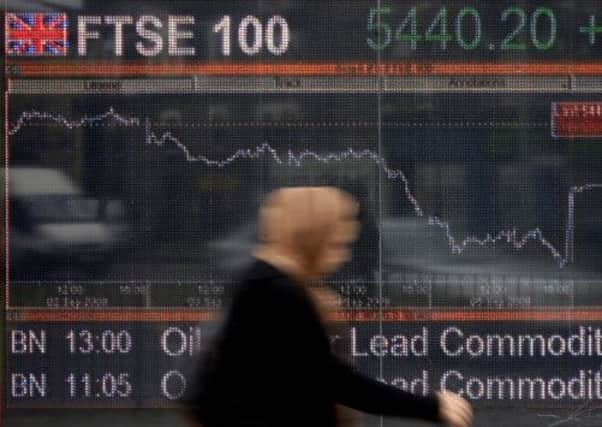Firms face backlash or tax rises over cash pile


Figures show that the combined amount of gross cash amassed by FTSE 100 businesses has grown by £42.2bn, or 34 per cent, since the financial crash of 2008 to reach a record £166bn.
The increase alone is enough to pay for the HS2 rail project or meet more than a third of Whitehall’s annual fiscal deficit.
Advertisement
Hide AdAdvertisement
Hide AdStripping out debt and other liabilities, the net cash position of Footsie stocks – excluding banks and other financial services companies – has posted a six-fold rise, soaring from £12.2bn in 2008 to £73.9bn this year.
Justin Damer, commercial director at Capita Asset Services, which compiled the data, said: “They have continued to hoard cash even as the economy has gone up through the gears, and this will prove unpopular with investors, who resent companies sitting on huge cash piles.
“If the cash piles do go unspent for a prolonged period of time then there is the risk that the UK government will turn its eye on them for some form of additional tax. While unlikely, there is certainly a precedent, as investors in North Sea oil will remember.”
While the largest blue-chip firms may still be hoarding their cash, a report also out today from accountancy firm BDO and the Quoted Companies Alliance (QCA) showed a dramatic rise in confidence among small and mid-cap stocks.
Two-thirds of businesses are confidence about the outlook for the UK economy over the next 12 months, compared with 8 per cent a year ago.
QCA chief executive Tim Ward said: “The pick-up in the economy appears to be translating into real results, which suggests those companies that previously expected their turnover to fall now see an improvement in their prospects.”
His tone was echoed by firms north of the Border, with the Federation of Small Businesses (FSB) in Scotland’s quarterly survey today showing confidence has hit a three-year high.
Andy Willox, the FSB’s Scottish policy convener, said: “Increased revenues and reduced levels of spare capacity suggest that firms are busier than they have been for a long time, but their profits and growth prospects continue to be put under threat by rising overheads.”
Advertisement
Hide AdAdvertisement
Hide AdEconomists believe confidence among businesses is translating through to a continued improvement in the jobs market, with the Bank of Scotland’s monthly employment monitor this morning reporting demand for permanent staff grew last month at fastest pace for two years.
The lender’s jobs barometer dipped to 59.7 from 60.3 in July, but Donald MacRae, chief economist at Bank of Scotland, said: “Rising business confidence is translating into increasing employment. August’s barometer was at the second-highest level since September 2007.”
Experts say confidence is also filtering through to the high street, despite a dip in footfall at Scotland’s shops last month.
Scottish Retail Consortium (SRC) data out today showed footfall fell by 0.3 per cent year-on-year north of the Border, slowing from July’s 1.3 per cent fall and beating the UK’s 0.9 per cent decline.
SRC director Fiona Moriarty added: “The signs are that confidence is gradually returning in our high streets and town centres.”